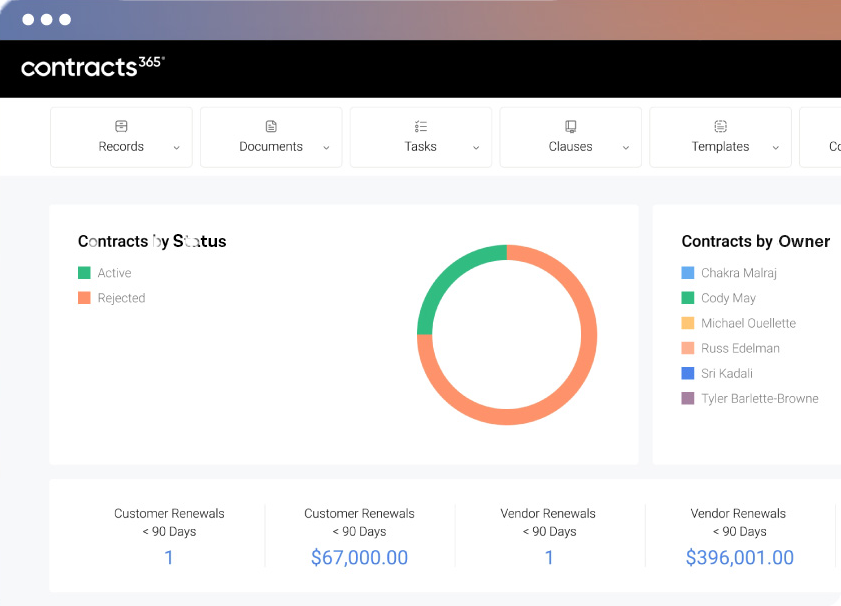Introduction
Modern businesses invest heavily to continually improve sales performance. Yet despite the heightened levels of sophistication in these areas, the notion of integrating the discipline of contract management into a company's sales process is often overlooked. For the context of this blog post, I am going to focus on CRM and Contract Lifecycle Management Software and the benefits of integrating them.
CRM Applications and CLM Software: A Brief Overview
Customer Relationship Management (CRM)
Customer Relationship Management (CRM) applications have been the primary software solution for sales professionals and leadership for decades. Within a CRM application, salespeople track details of their opportunities, accounts, leads, contacts, and other sales-related information. They also document where their opportunities stand within the overall sales cycle and indicate when and how likely each deal is to close. The summary of potential sales coming in for the month, quarter, year, etc. is a valuable indicator of the health of any business.
In succinct terms, the core functions of CRM apps enable forecasting, tracking, and management of sales leads, opportunities, and customer data while providing reporting and dashboards to executive management.
Contract Management Software Streamlines the Contract Lifecycle Management (CLM) Process
Readers of our Contract Management Blog are probably familiar with the process of Contract Lifecycle Management (CLM) and Contract Management Software, also known as CLM Software. . For the benefit of those who may be unfamiliar with such solutions, contract management software helps companies manage contracts through the many stages of their lifecycle.
The 9 stages of contract lifecycle management refer to the stages an agreement goes through during its natural evolution. The contract lifecycle often begins when someone in the business submits a request for a new contract to the legal department. A common example is when a salesperson is ready to bring on a new customer and requests the contract be drafted by the legal department to facilitate closing the deal. Following the contract request, the contract is drafted, negotiated, reviewed, approved, and finally executed. Each of these processes is an example of the different stages in the contract lifecycle. Contract management software makes this process as streamlined and efficient as possible, reducing the time and human effort required to advance from one stage to another. This result is often achieved by leveraging document authoring and workflow automation tools.
If It Ain't Broke, Why Fix It?
Now that you understand what CRM and CLM software does, it should be clear why integrating these systems could be valuable for some, if not most, companies.
However, if your company has both types of applications in-house and things are running smoothly despite not having integrated them, you might ask yourself, "why change"?
We've observed with many companies that when a new sale is imminent, the salesperson leaves their CRM application to email, call, or IM someone in legal to request the contract be drafted. This often leaves the door open for the following:
- Poor visibility and tracking: Without an integrated sales contract request experience, understanding the current status of a contract as it relates to a specific account or opportunity is often much more difficult.
- Redundant and potentially inaccurate data entry: Without an integrated sales contract request experience, metadata related to the opportunity or account will often need to be duplicated manually when it already exists in the CRM. Whenever manual data entry exists, so does the increased chance of error.
- Lower than optimal sales productivity: It stands to reason that sales reps would be more productive and focused if they could remain within the CRM application for all activities specific to their job, including contract-related activities like generating requests or checking on the current status.
Including contract management within the overall sales cycle, rather than treating it as a separate process, can improve all the abovementioned conditions.
What Does an Integrated Contract Management and Sales Experience Look Like?
Going on the assumption that a company has both contract management software and a CRM application in-house, how would an integration present itself to users of both platforms?
As described above, when a new sale is imminent, the salesperson typically requests a contract to be drafted by the legal department by leaving their CRM application to an email, call, or IM the legal contact.
With an integrated experience, key functions and features of contract management software appear within the CRM application, allowing salespeople to request the contract with little or no re-keying information about the customer or what is being sold and without leaving their primary business application. They can also search for contracts and check approval statuses without distracting contract managers from potentially higher-value work.
Similarly, legal and contract management professionals will be completely aware of high-value tasks in their queue and enjoy knowing that repetitive low-level tasks have been automatically addressed for them.

5 Benefits to Integrating Your CRM and Contract Management Software
Now that we have established a basic understanding of what CRM and CLM Software do and what an integrated experience looks like, it is time to explore the business benefits of integrating these systems.
1. Close deals faster
Arguably, the most valuable benefit of having an integrated contract management and sales experience is shorter sales cycles. Particularly, when a self-service request process is set up to draft the contract automatically from a template, the time it takes to deliver it back to the sales rep can be reduced from weeks or days to just seconds. Carving any amount of time out of the sales cycle will allow reps to close deals faster and potentially close more deals within a given timeframe.
2. Focused salespeople
Most leaders in any business discipline agree the less time their employees spend on administrative tasks, the better. For sales reps, that means spending less time on emails, data entry, and following up on the status of their contracts and more time in front of customers. Dashboards, collaboration tools, and automated workflow approval processes are some of the functions that make it possible for salespeople to spend more time selling.
3. Enforce contract standardization
A common reason companies implement integrated contract management software is to ensure that only approved contracts are used and that the correct approvals are obtained before documents are shared or executed. An integrated contract management and sales experience are beneficial in making sure the correct information is collected during the request process, typically on an electronic form. By way of system automation, the data collected from the sales rep on the request form can assemble the contract according to your unique business rules and trigger all necessary approvals. A bonus is that this systematic process also eliminates rogue contracting behavior.
4. Informed negotiations and business decisions
Another aspect of the integrated experience is that executed contracts can be automatically stored in the account or opportunity record in the CRM, making it easy to find at a moment's notice. While this may sound like a rather simple thing, a large percentage of our prospective customers call us initially because they are challenged to make contracts accessible during the heat of negotiation or when a customer spontaneously calls to purchase more products.
5. Ensure obligations are being met
Once a contract is executed, some obligations need to be met by both parties. Take an example from my business, a software company. When we sign on a new customer, we are obligated to implement the our contract management software according to the terms documented in the contract. With an integrated CRM and CLM software experience, these obligations can be memorialized outside of the document and presented to the responsible party at the right time, ensuring higher levels of compliance and a great customer experience.
Conclusion
Considering the points made above, the decision of integrating your Contract lifecycle management software and CRM applications might be answered by your view of contract management and its importance in the overall sales process in your unique circumstances.
However, if the benefits of shorter sales cycles, higher productivity levels, language standardization, improved negotiations, and better obligation management are appealing, it makes sense to consider getting CLM software, such as Contracts 365, that seamlessly integrates with your CRM. Contracts 365 is the leading contract management software for Microsoft 365 customers. Because Contracts 365 is purpose built for Microsoft customers, it integrates seamlessly with CRM applications such as Microsoft Dynamics and numerous Microsoft business tools.
To learn more about how a fully integrated contract management system can fuel business success, browse our free resource library. Here, you can find ebooks that delve more deeply into specific CLM-related topics, case studies that illustrate the experiences of real customers with Contracts 365, our blog, and more.
Please don’t hesitate to reach out to us or even better, request a demo and we can show you how our integration works in real time.
Subscribe and receive our latest blog articles in your work email.
We value your privacy. By subscribing, you agree to receive our newsletter. We’ll protect your personal data and use your email only for sending useful information. You can unsubscribe anytime. For details on data handling, please see our privacy policy.
Ready to Learn More?
Optimize your team’s contract lifecycle management with Contracts 365®
